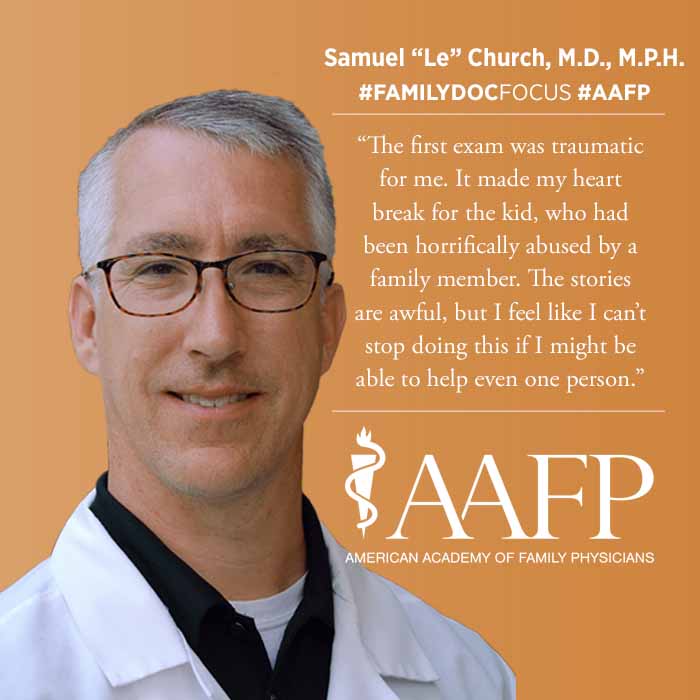FP Steps in With Compassion for Child Sex Abuse Victims
October 15, 2018 3:01 pm David Mitchell – When the only certified pediatric sexual assault nurse examiner left the area where Samuel "Le" Church, M.D., M.P.H., practices, the family physician was asked to fill that void.
Church, a busy solo doctor in rural Hiawassee, Ga., took the required training and shouldered the additional responsibility. It wasn't easy.
"The first exam was traumatic for me," Church said. "It made my heart break for the kid, who had been horrifically abused by a family member."
Ten years later, Church is still providing the service to his community and region.
"The stories are awful," he said, "but I feel like I can't stop doing this if I might be able to help even one person. And the alternative is for the children and the advocacy team to travel over two hours to a larger city that provides these services."
That first exam was in a hospital ER, and police and social workers were on the scene. Church, frustrated by his inability to protect the child's privacy, insisted that all future exams take place at his practice. There, he ensured children's privacy by shutting down his practice when such exams -- sometimes up to four a week -- were necessary.
That strategy eventually proved impractical for his patients and the midlevel provider in his practice. So, Church did the only thing that made sense to him: He built a new office with a separate entrance, exam room, conference room and play area especially for sexual assault survivors. He also included second-floor apartments for the medical students who rotate through his practice.
Church isn't paid for precepting, and the reimbursement for providing the exams is "modest," he said. But Church said return on investment wasn't a consideration.
"I didn't ask myself that question," he said. "It just had to be done."
Church is a medical director for child advocacy centers, and he provides forensic exams for patients in six counties. He also teaches others how to perform the exams.
Church -- vice speaker of the Georgia AFP, a member of the AAFP's Commission on Organization and Finance, a member of the AAFP's CPT adviser team and a high school wrestling coach -- does more on the issue of child abuse than providing and teaching forensic exams. With grant support from the Georgia AFP, Church also presents the Stewards of Children abuse prevention program to churches, business, community groups -- basically, to anyone who will listen -- because 90 percent of perpetrators are known to child victims or their families. At least one in 10 American children will be sexually abused before age 18, he said.
"It's an uncomfortable topic, and many folks feel like they are already adequately educated," he said. "We need to shift responsibility from institutions and make this everyone's responsibility. Parents need to manage their children's activities and know who their children are with."
Victims are at increased risk for substance abuse, decreased school performance, depression, teenage pregnancy, relationship difficulties, substance abuse and more, Church said. More than 80 percent of child sexual abuse occurs in one-on-one situations. Despite the high rates of abuse, the vast majority of assaults are never reported, leading to the perception that the problem is more limited.
In addition to community groups, Church also teaches the prevention program to the medical students he mentors.
"It's not an official part of their curriculum," he said, "but I squeeze it in there. I want to make sure they are aware of this major public health issue, not only as future physicians, but as parents and community leaders."
